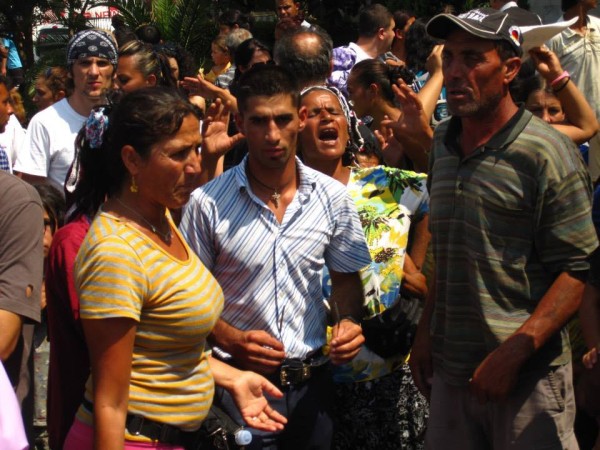CRISIS COUNCIL OF THE ASSOCIATION OF DISPLACED ROMA AND EGYPTIANS FROM KOSOVO IN MONTENEGRO
PRESS RELEASE
TIRED OF WAITING FOR JUSTICE AND RIGHTS, AND THE RIGHT TO DECIDE ON THEIR OWN DESTINY
For the last 14 years Roma and Egyptians displaced from Kosovo live in the Konik 1 camp without any right to make decisions about their own lives. After the tragic fire in the camp, the Crisis Council, which was established at that time, started their 16-month long struggle with the representatives of the EU Delegation and other institutions relevant for the solution of the problems that the camp residents are faced with. In spite of the promise that the representatives of the camp will be involved in the process of decision-making that affects their lives, nothing has been changed. That is the reason why we are forced to reiterate our demands.
- As 14 years ago European Union promised to solve the problem of displaced Roma and Egyptians from Kosovo and did not manage to achieve that goal, we demand immediate meeting with the High Representative of the European Union for Foreign Affairs and Security Policy Ms Catherine Ashton where we could discuss our concerns and ways forward
- Full participation in all relevant bodies and decisions of all current and future projects of state institutions, international organizations and bilateral donors targeting residents of the Konik camp
- · Involvement of the Crisis Council representatives in the Steering Committee in accordance with the contractual formal obligations for the Technical Assistance to the government on the project “Identification of durable solutions for displaced persons and residents of Konik camp, a project supported by the EU Delegation. The SC is responsible for coordination and financial reporting, supervision of the construction project and other activities relevant to the proper implementation of the project.
The government Montenegro has joined the regional initiative called the Decade of Roma Inclusion 2005–2015. By doing so, the country assumed the obligation to work systematically and continuously on improving the situation of their Roma com- munities. However, while a considerable number of Roma from Kosovo live Montenegro, and this initiative is also an opportunity for the inclusion of the Roma from Kosovo, this is not reflected in the programs so far conducted by the government within the framework of the Decade. As a result, the Roma from Kosovo remain without the possibility to effectively use and access these programs, while effectively participating in decision-making process.
The Government coordination body in charge of the implementation of the Strategy for identifying long-term solution for the status of the internally displaced persons had its last meeting in December 2012.
58% of the camp residents submitted their applications for permanent residence in Montenegro. The situation is getting increasingly difficult due to the problems with the documents that require procedures and high costs, as well as the confusion about the number of years in different categories of residence that are required for obtaining Montenegrin citizenship. Temporary access of displaced persons to social and economic rights has been extended by June 2014. None of the people from the camp has been involved in the process of solving these problems, although 580 of them signed the petition demanding to be involved.
The European Union has a vital role in achieving, through the Process of Stabilization and Association, as its name suggests, the elimination of the consequences of the war and the establishment of long-term and sustainable stability in the region.
However, recent policy conditionality by the European Union toward Montenegro regarding Kosovar Roma has been ineffective.
For 2013-14, the European Union has committed millions of Euros for Roma from Kosovo living in Montenegro. But residents of the Konik refugee camp do not expect much from this money. They have seen the same pattern over the last 14 years where lots of money comes in their name, but their situation is getting worse because of the ways this money is spent.
Podgorica, 26 November 2013






